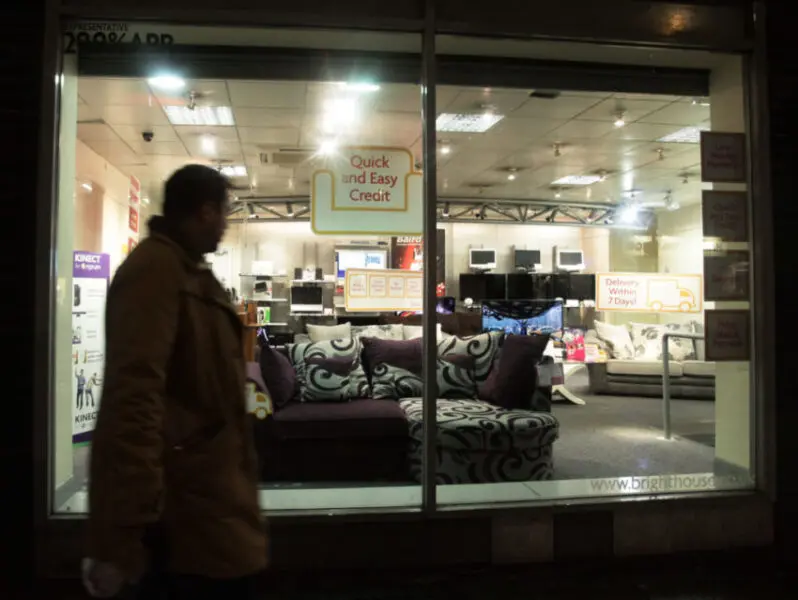A price cap on the rent-to-own sector which could save consumers up to £22.7 million per year collectively has been proposed by the City regulator.
The sector has around 300,000 customers – some of whom may end up paying four times the average retail price for products.
Under the new price cap proposed by the Financial Conduct Authority (FCA), credit charges would not be more than the cost of the product – meaning customers do not pay more than double the retail price they see in the shop.
The regulator calculates that, for example, someone getting a gas cooker could potentially save around £606 under the cap, while the savings on a fridge-freezer and a smart TV could be around £360 and £336 respectively – although actual savings would vary depending on the particular circumstances.
We estimate this will save consumers £19.6m-22.7m per year without significantly reducing access to credit for people who have few alternative options #faircredit pic.twitter.com/30SwirfC5e
— FCA (@TheFCA) November 22, 2018
The cap, subject to consultation, will come into force on April 1 2019, providing protection for some of the most financially vulnerable people in the UK, the FCA said.
In addition, rent-to-own firms would need to benchmark the cost of products against the prices charged by three other retailers.
The FCA is also introducing a two-day cooling off period for the sale of extended warranties.
This will effectively ban firms from selling these warranties at the point of purchase, and will come into force on February 22 2019.
The rent-to-own sector allows people to make small payments each week for household goods.
But often customers focus on the weekly payments rather than the overall cost, the FCA found.
The FCA said rent-to-own customers are some of the most financially vulnerable in society.
Some 61% are women, less than 5% own a home, more than half are on state benefits and nearly 60% have no savings.
Only one third are in work, most are on low incomes of between £12,000 and £18,000, and they are likely to have missed a bill payment in the last six months.
Despite this, firms often charge these customers more than other retailers for essential household goods such as a washing machine or a cooker, and, with add-on insurance and warranties, in some cases rent-to-own customers can pay up to four times the average retail price, the FCA said.
BrightHouse, a major firm in the rent-to-own market, said it has been “working closely and constructively with the FCA over a number of years”, leading to many changes in how it operates and serves customers.
A BrightHouse spokeswoman said: “We’re going to carefully consider today’s announcement, while continuing to offer those excluded from mainstream credit ways to get the household goods they need.”
Consumer campaigners welcomed the plans from the FCA, which has previously capped the cost of payday loans.
Rent-to-own customers are some of the most vulnerable high-cost credit users – but are paying high prices and high interest charges #faircredit pic.twitter.com/CF5UGQxeSB
— FCA (@TheFCA) November 22, 2018
Gillian Guy, chief executive of Citizens Advice, said: “This cap is a victory for people who struggle with the runaway costs of rent-to-own agreements.”
Martin Lewis, founder of MoneySavingExpert.com, said: “The fact that the most vulnerable with the least pay four times as much for their electrical and white goods as everyone else is simply unjust and it’s rightfully about time that the FCA cracked down on it.”
He continued: “I hope that this is only the first sector that the FCA cracks down on – we also need to see similar changes to unauthorised overdraft costs, logbook loans and others.”
Joanna Elson, chief executive of the Money Advice Trust, the charity that runs National Debtline, said: “Following its successful intervention in the payday loan market, this is another sign the regulator is taking problems with high-cost-credit seriously.”
FCA chief executive Andrew Bailey said: “A cap will prevent firms charging over the odds for essential everyday items like cookers or washing machines.
“We believe a cap is the only intervention that will effectively tackle the highest prices. If implemented it will save consumers up to £22.7 million a year from excessive charges.
“We want to stop consumers having to pay many multiples more than the price of a product on the high street.”
The FCA has been looking into the high-cost credit sector generally – as well as potential alternatives to high-cost loans.
It said it is working closely with the Government and other relevant organisations to support a number of initiatives.
Asked if the moves could lead to some rent-to-own firms exiting the market, Chris Woolard, executive director of strategy and competition at the FCA, told the Press Association: “We’ve already taken quite a lot of action to get them into line with our rules … and this is really about how do we make this market work well going into the future.”
He said many customers “will benefit from cheaper prices and indeed fairer prices”.
The consultation on the price cap and benchmarking proposals will be open until January 17 2019.


